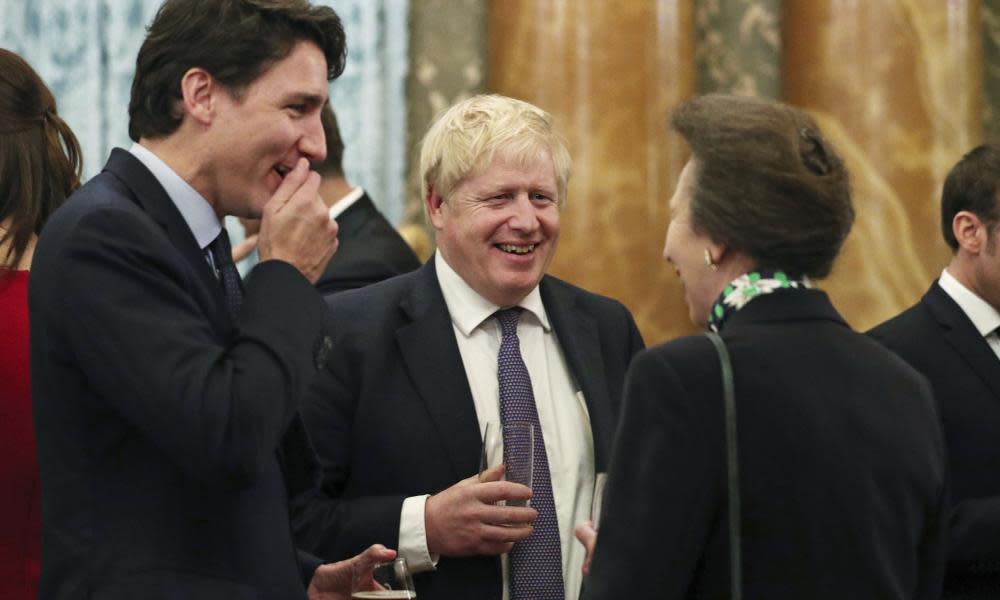Is the Trump playbook the new model for British politics?

Monday
I’m not sure what the protocols are for these sorts of events, but the sight of Boris Johnson and Jeremy Corbyn attending the vigil for Jack Merritt and Saskia Jones, who were killed in the London Bridge terrorist attack, felt like shameless political grandstanding: a desire to be seen to be doing the right thing, rather than heartfelt sympathy. And judging by what Jack’s father later wrote about the prime minister he would probably have also preferred Johnson to be a no show. Shortly after the vigil, various members of one of my WhatsApp groups expressed much the same feeling and we made a promise to actively prevent politicians from pitching up at our funerals or hospital beds if we were killed or injured in a terrorist attack or some other major incident. Should the prime minister, or any other political leader, try to muscle in on my family’s grief, I want a security detail to escort them off the premises. If they insist on making statements “to express the nation’s feelings” they can do so via a video-link from their own bedrooms. And there will be no need for them to worry about looking as if they didn’t give a toss by not attending, because my friends will have put out a statement to the media saying they were NFI. Not that I have given much thought to what sort of funeral I do want, though I’ve always thought how weird it must have been for the Queen Mother to look out of her bedroom window and watch the military rehearsing for hers. But my friend Simone has her funeral arrangements totally sorted. While her close friend Ali was dying of cancer, she dreamed of her own funeral – the music, the readings – in its entirety. When she woke up she remembered everything, thought it to be just perfect, and wrote out her instructions. I’m still waiting for that dream.
Tuesday
A study of 2,000 Americans has found that most people think 41 is the age at which it is far too late to start exercising. For once I find myself on the right side of medical advice, if not necessarily for all the right reasons. I took almost no exercise at all in my 20s – heroin addiction and elite sport proved somewhat incompatible – but once I got clean I started running and going to the gym obsessively. Sometimes more than once a day. When I couldn’t sleep, I’d even go out running in the middle of the night to feel the freedom of the streets and escape my thoughts. Once the children arrived, I rather let myself go for about six years – coping with two toddlers and work was a 24-hour job – but after I’d spent a month at a mental hospital being treated for depression, I restarted a four- or five-day-a-week exercise regime, to give me time off from myself, as much as anything. One of the best parts of exercising is the mental numbness induced by pushing yourself hard and the feeling of relief when you eventually stop. And I’ve kept at it ever since. I’m probably one of the few members of my Streatham gym who has been going regularly for more than 20 years. It’s had its frustrations and losses. Back in my 40s, I was furious that no matter how hard I trained, I couldn’t run as fast as I did in my 30s. Then I had to give up running altogether as my knee gave out and, after several surgeries, ended up with a metal one. So now I pound the cross trainer and pump iron in a desperate attempt to reach the levels I attained in my 50s. Like so much of my life, the act of being me has been achieved by a desire to not be me. I’ve a way to go on the self-acceptance front.
Wednesday
After pitching up at the commandeered leisure centre to pick up my pass, going through airport security checks and getting put on a shuttle bus that drove through several heavily guarded road blocks and a perimeter fence to get to the Nato summit at a golf resort outside Watford, it later dawned on me the reason for the levels of security. It wasn’t to protect the 29 Nato leaders from an outside attack, it was to prevent them from attacking each other. If the summit had lasted another day, the west could have been at war with itself. After Justin Trudeau, Boris Johnson, Princess Anne, Mark Rutte and Emmanuel Macron had all been caught on film mugging off Donald Trump at a Buckingham Palace reception the night before, the atmosphere in the compound was fairly toxic. And not just because the media were being fleeced £12 for three tepid meatballs and a handful of potatoes that Ikea would have turned its nose up at. First, we had the US president throwing a strop – who would have guessed that a narcissistic bully could be so thin-skinned? - and trashing Trudeau as “two-faced” before leaving early without giving a press conference. Then Johnson went out of his way not to refer to Trump by name while insisting he hadn’t been filmed in the film in which he had been filmed. At that point Dominic Cummings, who was standing to one side of the room, having previously declared he wasn’t working for No 10 during the election, made a throat-slit gesture and the PM cut short his own press conference. Overhead you could hear the thunder of helicopters. It wasn’t immediately clear if they were incoming gunships or an outgoing president. Taking no chances, I jumped the queue for the shuttle bus back to the station.

Thursday
Just a week to polling day and I am counting down the days. It’s hard to believe it but the election campaign has become more toxic and more depressing the longer it has gone on. Almost as if the Trump playbook is the new model for British politics. One where no voter necessarily believes very much of what any of the two main party leaders has to say but isn’t that bothered because we’ve reached a point where no one expects a politician to tell the truth. Not just on the big things, such as Brexit or the economy, but on the trivial too. In his interview with Julie Etchingham, Jeremy Corbyn tied himself in knots by lying about watching the Queen’s speech on Christmas day. Why do it? Literally no one would care much one way or the other. Almost no one watches the speech anymore. My mum and dad gave up some time in the 1970s. Probably around the time most members of the royal family stopped watching it. I’m fairly sure that Prince Andrew will want to give it a miss this year. As for the prime minister, it’s long since been priced in that any lie will do. His apology for his own Islamophobic comments on ITV1’s This Morning programme was even less convincing than Corbyn’s for his failure to act on antisemitism within the Labour party. It’s almost as if senior figures in both parties have realised they can get away with almost anything and are hellbent on pushing it to extremes. Labour lies about how much its policies will save families, while the Tories openly invent hospitals that will never be built and fantasise about a Brexit trade deal that will take years. Only today Sajid Javid declared Labour was responsible for the rise in homelessness over the past nine years. Literally the worst lie ever. It would be nice to think that our politicians have guilty sleepless nights but somehow I doubt it. We are into a new level of pathology. One that I fear is beyond treatment.
Friday
I wrote recently about my father’s service during the war, how he never talked about it and how, though he died more than 20 years ago, I have come to miss him more and more. One kind reader, Richard Gupwell, sent me an extract about the battle in which my father was sunk on HMS Quentin. I reproduce it in full. “Force Q, comprising the cruisers Aurora, Argonaut and Sirius, accompanied by the destroyers Quentin and Quiberon intercepted a convoy off the Gulf of Tunis shortly after midnight on December 1st-2nd 1942. Admiral Cunningham writes: ‘Engaged at point-blank range four supply ships or transports and three destroyers were sunk or set on fire. It was a ghastly scene of ships exploding and bursting into flame amidst clouds of steam and smoke; of men throwing themselves overboard as their ships sank; and motor vehicles carried on deck sliding and splashing into the sea as vessels capsized … not one ship of that convoy survived. Our submarines next morning reported large areas covered in debris and thick oil with numbers of floating corpses in lifebelts. We suffered no losses or damage during the action; but on the way back to Bone in the early dawn the Quentin was sunk by a torpedo from an enemy aircraft. Most of the crew were rescued by HMAS Quiberon under heavy bombing.’” I just wish I had made the effort to find this out when my dad was still alive. Like so many, I took what he had suffered for granted.
John Crace’s new book, Decline and Fail: Read in Case of Political Apocalypse, is published by Guardian Faber. To order a copy go to guardianbookshop.com or call 0330 333 6846. Free UK p&p over £15, online orders only. Phone orders min. p&p of £1.99.

 Yahoo News
Yahoo News 
